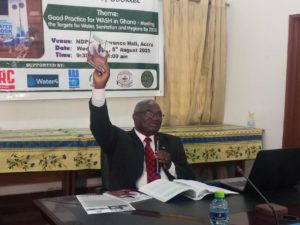NDPC launches report on Good Practice for WASH in Ghana
 The National Development Planning Commission (NDPC) has launched a report on Good Practice for Water, Sanitation and Health (WASH) in Ghana.
The National Development Planning Commission (NDPC) has launched a report on Good Practice for Water, Sanitation and Health (WASH) in Ghana.
The 57-page report, dubbed: “Good Practice for WASH in Ghana – Meeting the targets for Water, Sanitation, and Hygiene by 2030”, was authored by the NDPC in collaboration with International Water and Sanitation Centre, also known as, IRC – Ghana.
It highlights experiences in three districts of Ghana – Bongo, Wassa East, and Asutifi North, reflecting efforts to achieve the Sustainable Development Goal (SDG) for WASH.
The districts were said to represent examples from real-life about making progress towards the targets set by the Government.
“These ‘best practices’ stories have been collected by the NDPC, which advises the President on development strategies.”
Launching the report in Accra, Dr Kodjo Mensah-Abrampa, Director General of the NDPC, said, he saw great value in the ability of districts to learn from one other.
“Having good examples is fantastic. If we are able to emulate them and use that to plan in the country, then we can talk about success.”
He noted that the provision of safe water was a highly visible and important issue that affected people’s daily lives and that the task to achieve good sanitation was still a greater challenge for Ghana.
The Sustainable Development Goal for WASH (SDG 6) is to ensure the availability and sustainable management of water and sanitation for all, by the year 2030.
In 2017, 19 per cent of the population in Ghana is said to miss out on access to at least a basic level of water services and only 36 per cent were using safely managed water accessible on the premises.
In the same year, almost one in five (18 per cent) of the population was still practicing open defecation.
The NDPC selected the three districts to highlight successes and challenges — broadly illustrating good practice in the north and middle ecological zones.
All three districts have made strong efforts to improve access to water and sanitation and have also embraced innovative approaches.
Dr Felix Addo-Yobo, Acting Director, Development Policy Division, NDPC, said the situation in the WASH sector in Ghana was not the best; and that, it was, therefore, essential that stakeholders put their heads together to look for innovative ways of addressing them.
He appealed to Metropolitan, Municipal and District Assemblies (MMDAs) to pick up some of the good lessons from the report and replicate them in their jurisdictions.
Mr Addo-Yobo noted that access to water and sanitation was very fundamental for improved health, productivity, basic education, and socio-economic development; and that, civil society organisations through their advocacy role, were playing a critical role in the WASH sector.
Madam Vida Duti, the Country Director of IRC Ghana, said IRC, as an international non-governmental organisation supported governments in partnership with other organisations towards improving systems that run the delivery of water and sanitation services.
She said it was in line with that, her organisation had had an agreement with the Government to support the development of the systems that were required for the delivery of SDGs in Ghana; adding that, “it is in this light that we collaborate with the NDPC to document best practices for the delivery of WASH in Ghana”.
Source: GNA
